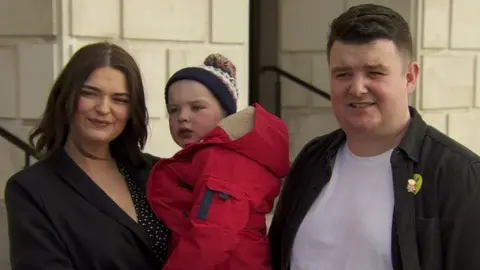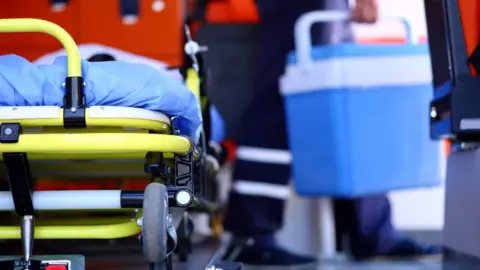Dáithí's Law: What is it and why has it been delayed?
 PA Media
PA MediaA law ushering in a new opt-out organ donation system in Northern Ireland is due to progress this week after a last-minute intervention by the UK government.
Dáithí's Law, as the legislation is known, will mean people automatically become potential donors unless they explicitly say they wish not to be.
The legislation was passed in February 2022 and was due to take effect in this spring but has faced continual delay amid the political stalemate at Stormont.
Now the government has decided to take it through Westminster to ensure the new system is implemented.
Northern Ireland is the only part of the UK where an opt-out system is not yet in place.
So what is the background to the law and why is it taking so long to be introduced?

Who is Dáithí?
Dáithí Mac Gabhann was born in 2016 with hypoplastic left heart syndrome, meaning the left side of his heart did not form correctly.
The six-year-old has been on the list to get a heart transplant for about five years, with his family campaigning for a change in organ donation laws since 2018.
Assembly members at Stormont decided to name the Organ and Tissue Donation (Deemed Consent) Bill after him in February 2022 in recognition of his family's campaigning efforts.
How did Dáithí's Law originate?
An opt-out organ donation system was debated in the Northern Ireland Assembly as far back as 2012 when then Ulster Unionist assembly member Jo-Anne Dobson introduced a private member's bill on organ donation.
While that failed after being rejected by Stormont's Health Committee in 2016, the conversation picked up again two years later when Dáithí Mac Gabhann's family began campaigning for a soft opt-out law.

The new bill was supported by all of Stormont's parties except the Democratic Unionist Party (DUP), with some DUP members saying they preferred an opt-in organ donation system.
But in June 2021 the DUP's Paul Givan, who was first minister at that time, announced he had given approval for the legislation to go ahead to the assembly so it could potentially pass into law.
At the time then Health Minister Robin Swann said about 180 lives could be changed each year by overhauling the rules.
The law passed its final stage in the assembly in February 2022 but secondary legislation is needed to specify which organs and tissues are covered under the opt-out system.
Without it the system cannot come into effect.
What is holding it back?
In the same month the law passed its final stage in the assembly a seismic shift occurred in Northern Ireland politics - Paul Givan resigned as first minister as part of the DUP's protest against the Northern Ireland Protocol.
After the Stormont election in May 2022 the DUP continued its boycott by blocking the election of a Speaker in the assembly, which prevented the formation of a power-sharing government in Northern Ireland.
Without a Speaker, legislation - including the secondary legislation necessary to enact Dáithí's Law - cannot be passed.
The DUP argued that the legislation on organ donation in Northern Ireland could be dealt with at Westminster.
 Getty Images
Getty ImagesThis month the party's MPs tabled an amendment to the Executive Formation Bill to progress the law through the UK Parliament instead.
The amendment was co-signed by MPs from the Social Democratic and Labour Party (SDLP) and the Alliance Party.
It was not clear whether the House of Commons Speaker would accept the amendment because of the bill's narrow scope, which extends the deadline to hold an assembly election if there is no executive formed.
Northern Ireland Secretary Chris Heaton-Harris argued that the secondary legislation necessary for Dáithí''s Law would be better dealt with by the Stormont assembly with when it returns to action.
But on 19 February he told Dáithí's father Máirtín Mac Gabhann that the government would make the amendment to the Westminster bill.
Unlike amendments tabled by opposition MPs, it is rare that government amendments are rejected by the Speaker's office.
Mr Heaton-Harris said the government's intervention on the matter was "exceptional" given "just how important this issue is".
What does Dáithí's family have to say?
Previously Dáithí's parents said they were willing to take legal action over the delays, adding that time was not on their side as their son's health was deteriorating.
But speaking after confirmation of the government intervention, Dáithí's father Máirtín said it was an emotional day.
"We feel as though we have had to again move mountains to achieve this and we are very proud of ourselves and of Dáithí," he said.
What system is in place in Northern Ireland?
Organ donation only proceeds in Northern Ireland if a person has given their express consent, usually by signing on to the NHS Organ Donor Register or by speaking to their family.
In the absence of that the family is asked to decide on behalf of the patient.
Dáithí's Law would mean all adults in Northern Ireland would be considered potential organ donors after their death, unless they have specifically stated otherwise.
Statistics published by the Public Health Agency in 2022 showed that 90% of people in Northern Ireland support organ donation but only half of people have signed the Organ Donor Register.
It also stated that about 10 to 15 people die each year while waiting on a transplant.
What about the rest of the UK and the Republic of Ireland?
In December 2015 Wales became the first nation in the UK to introduce the soft opt-out organ donation scheme.
One year later the Welsh health secretary said the number of donations under the new law was "encouraging" but it was too early to tell how effective the bill was going to be.
England brought in a similar law in May 2020, with 296 donations under the law in the first year, accounting for 29% of all donors (1,021) in that period.
Opt-out organ donation came into affect in Scotland in March 2021, slightly later than planned due to the Covid-19 pandemic.
The Human Tissue Bill was introduced in the Republic of Ireland in November 2022.
It is currently moving through the Oireachtas (Irish parliament).
